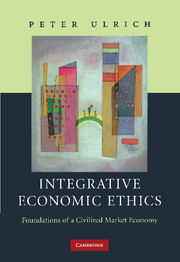Book contents
- Frontmatter
- Contents
- List of figures
- Preface
- Translator's note
- Introduction: orientation in economic-ethical thinking
- Part I Fundamental concepts of modern ethics and the approach of integrative economic ethics
- 1 The phenomenon of human morality: the normative logic of interpersonal relations
- 2 The moral point of view: philosophical developmental lines of rational ethics
- 3 Morality and economic rationality: integrative economic ethics as the rational ethics of economic activity
- Part II Reflections on the foundations of economic ethics I: a critique of economism
- Part III Reflections on the foundations of economic ethics II: rational economic activity and the lifeworld
- Part IV A topology of economic ethics: the ‘sites’ of morality in economic life
- Bibliography
- Index of subjects
- Index of names
2 - The moral point of view: philosophical developmental lines of rational ethics
Published online by Cambridge University Press: 22 September 2009
- Frontmatter
- Contents
- List of figures
- Preface
- Translator's note
- Introduction: orientation in economic-ethical thinking
- Part I Fundamental concepts of modern ethics and the approach of integrative economic ethics
- 1 The phenomenon of human morality: the normative logic of interpersonal relations
- 2 The moral point of view: philosophical developmental lines of rational ethics
- 3 Morality and economic rationality: integrative economic ethics as the rational ethics of economic activity
- Part II Reflections on the foundations of economic ethics I: a critique of economism
- Part III Reflections on the foundations of economic ethics II: rational economic activity and the lifeworld
- Part IV A topology of economic ethics: the ‘sites’ of morality in economic life
- Bibliography
- Index of subjects
- Index of names
Summary
In the first chapter we adopted a phenomenological approach (i.e. from the meaning perspective of a participant in a familiar lifeworld practice) in order to work out the humanist core of the rational moral principle from the normative logic of interpersonal relations, independently, at this stage, of certain ‘schools’ of ethics. With this step alone, of course, we have not achieved a complete rational foundation of the moral principle. In the history of ethics the moral principle has also often been more intuitively grasped than rationally well-grounded; a number of developmental steps were necessary until, finally, in most recent times, modern philosophical ethics developed the categorial means for a convincing, strictly reflective explication of the moral point of view that can be regarded as a sufficient rational foundation.
In order to understand this reflective explication or justification of the moral point of view it is useful to trace briefly the most important intellectual and philosophical historical stages leading to it. It is basically possible to distinguish two elementary lines of development. Along the one line an increasing differentiation between ethical and strategic reciprocity takes place permitting a purification of rational ethics from aspects of interpersonal reciprocity that are external to morality. Along the other line there is a progressive generalization of the reciprocity principle from the concrete reciprocity of two opposites (alter and ego) to the abstract principle of universalization. Both lines of development are inextricably intertwined in the various interpretations of the moral point of view.
- Type
- Chapter
- Information
- Integrative Economic EthicsFoundations of a Civilized Market Economy, pp. 43 - 78Publisher: Cambridge University PressPrint publication year: 2008

